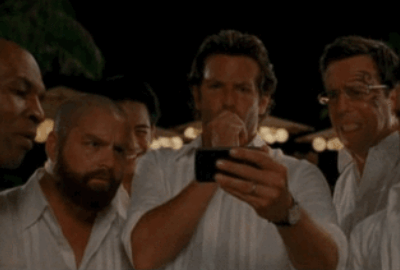“Don’t check your phone at the dinner table.” “Can’t you be off Facebook for more than 2 hours?” I don’t remember my mom scolding me for these things when I was younger, but growing up surrounded by Myspace, Twitter, Facebook and Instagram, we Millennials must admit that social media has started taking over our lives. The millennials were supposed to have flying cars and hover boards, but all we have is an app that sends a picture and deletes it six seconds later. I can’t help but wonder: what happened to our generation’s social skills if we can’t sit at the dinner table without checking our phones?
(Source)
There’s no doubt that social media lessens our face-to-face interactions. We send pictures all day long, find holding long conversations difficult and can’t seem to master the art of looking someone in the eye. A study commissioned by the social networking site Badoo shows that 39% of people in the United States spent more time socializing online than face-to-face in 2012. Since the population of the U.S. was 312 million in 2012, 121 million people were more social online. That number surpasses the population of Mexico.
Looking at our generation, we find ourselves asking if social media ruins the way we interact. But perhaps you ask that question differently. You think: “is it okay to Facebook friend my professor?” “Did I just spend all night live-tweeting my job to my best friend?” “Can I get a job if someone sees that kegstand picture of me on Facebook?” In reality, you actually consider the repercussions of a lack of face-to-face interaction by asking these questions.
(Source)
Social media, in the simplest terms, is good and bad for us. Krystine Batcho, professor of psychology at Lemoyne College, said that real-life interactions and social media interactions don’t address the same needs. Each provides different benefits and risks. Batcho said social media could be detrimental to developing social skills, increases addiction and anxiety, all while online bullying becomes more prevalent because without face-to-face interaction, people don’t face the fear of being caught. But she also says that social media in the long run has benefits such as increased global communication.
Think of the last time you were invited to a party: did you get an in-person invite or did you get a Facebook invite for “Jenny’s Awesome 23th B-Day Bash”? We’ve taken the lack of in-person interaction and accepted it as the norm. Are interpersonal skills lowering? Yes. Is cyber-bullying on the rise? Yes. BUT we can stay in touch with friends, whether they’re far away or ten feet in front of us, we can share tiny bits of our lives with the world in seconds and we are more open to sharing our personal beliefs and wants in a space where we cannot be judged directly by someone’s glare.
(Source)
I find myself sometimes being unsocial, I can’t sustain a phone conversation and I do that thing where you pretend you’re texting instead of sitting alone in a public place. But look at what I’ve received from media: I can message my friend who lives in California and show her what I ate for lunch because she can’t be at Chipotle with me.
But sometimes the ease of sharing of information with friends makes us share too much. Is showing people what we do every moment of every day a good thing? People spend their time trying to show that they’re having fun, rather than stepping away from technology and actually having fun. We Instagram our food, take pictures at concerts, make a Snapchat anytime we see something cool. With social media, sometimes when we’re there, we aren’t really there.
This idea of capturing life instead of living it doesn’t seem to be a new idea, but it blossoms under our generation. Most people never really felt they needed to take a picture of their dinner until Instagram rolled around. I take as a quirk of our generation.
While our generation shares food pictures on Instagram, our elders seem to find it pointless and criticize our generation for spending too much time on our phones. I find it confusing why the generation before us created all this technology and tries to criticize us for using it. Sure, we can find better uses of the Internet than cat videos, but for every cat video there’s a TED Talk, and for every selfie there’s a picture of a sunset. We decide to use social media how we choose and that’s why our generation isn’t doomed.
(Source)
I asked around my college about whether social media destines us for failure, and as far I could tell the consensus was that we control social media; it doesn’t control us. “I use my social media for myself. It helps me keep in contact with friends and do stuff like catch up on the news,” said Ashley Beram, sophomore at Penn State. And John Miller, a Penn State senior, said that while he thinks social media keeps us glued to our phones, we have the power to use it for good.
While the question of whether social media destroys social skills can’t truly be answered yet, we can attempt to use it for good. And ignore the fact that I can’t talk to you face-to-face without cringing. Who needs to anymore? Welcome to the future of social interactions.
(Main image source)



















